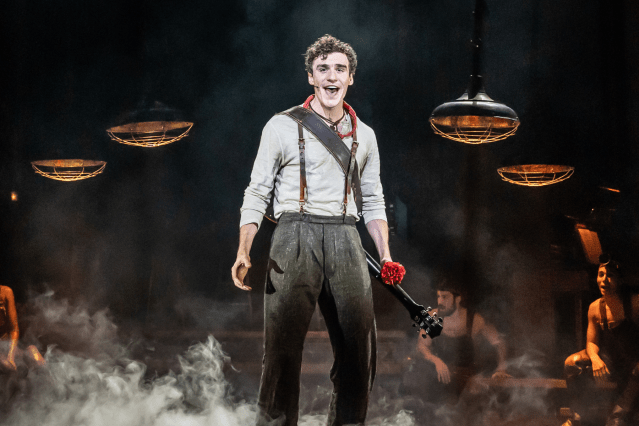Antony & Cleopatra (RSC)
Right from the start of Michael Attenborough‘s production of Antony and Cleopatra, the lines are drawn between the sybaritic Egyptian court, festooned in reds and purple and bathed in coloured lights, and the cold austereness of grey Rome.
Underlying these contrasts between Rome and Alexandria, hedonism and duty, are the twin themes of deception and betrayal – and, more than the struggle between the Danton-like Antony and the Robespierre of Octavius, it’s about the deceit that lies in all of us.
Nowhere is the sense of betrayal more palpable than in Antony’s final scenes with Enobarbus. The knowing glances between Enobarbus and Cleopatra and Antony’s demeanour when he looks beseechingly at Enobarbus to see that he is still true – there are cruel parallels with the Last Supper. It’s one of the most effective scenes in this production.
Less effective is Attenborough’s decision to excise Pompey from the text – which is a a bit like doing Hamlet without Fortinbras – a vital dimension is missing. As a result, we lose Menas’ proposal to kill the triumvirate and Pompey’s “This thou should have done…” reply. This short scene is a reflection of inherent intrigue and double-dealing; by removing it, Attenborough’s appears unwilling to investigate the story’s realpolitik.
His production is also not helped by Stuart Wilson‘s petulant Antony. Looking like a refugee from a Californian alternative therapy group – with attitude to boot – and adopting a truly hideous nasal whine, Wilson comes across as more the strumpet’s fool than one of the triple pillars of the ancient world. Sinead Cusack‘s sensual but capricious Cleopatra could do a lot better for herself. Still, Cusack manages an excellent performance as the woman coming to terms with her fading powers as both a ruler and sex symbol.
There are some even better performances from Clive Wood and Stephen Campbell-Moore. As a departure from the usual straight-talking soldier loyally following his commander but not his lifestyle, Wood’s Enobarbus has quite eagerly taken to the Egyptian way of life and is actively egging on Antony.
Campbell-Moore’s Octavius, meanwhile, is a wonderfully sexless and calculating bureaucrat. At the wine-drinking party, you sense his desperation to flee back to his spreadsheet as quickly as possible. Only at the news of Antony’s death does his façade crumble – tenderly caressing Antony’s bloody sword, the man behind the buttoned-up politician is briefly revealed. Elsewhere, Noma Dumezweni‘s dignified Charmian and Trevor Martin‘s striking cameo as Soothsayer are worthy of mention.
Nevertheless, the production’s overall effect is not of a great power struggle nor a great love affair but rather the private tragedy of two, not very attractive, individuals feasting themselves for one last time.
Note: The following review dates from April 2002 and this production’s Stratford run.
The fall of great political empires and the destructive force of passionate love are explored in this long, complicated and difficult play. The poetry is Shakespeare’s best, but the story is often difficult for newcomers to the play to follow. Not in this highly accessible version however. Director Michael Attenborough – in his last production for the RSC before taking over the Almeida – serves up a crowd-pleaser which will delight tourists and traditionalists, though the theatrical connoisseur may have some reservations.
Attenborough is a master storyteller and some severe but skilful cuts (Pompey’s rebellion has disappeared entirely) allow the central narrative and themes to emerge clearly. The show looks great. The costumes are traditional period ones, and Es Devlin‘s designs and Tim Mitchell‘s lighting tell the audience at once that Egypt (opulent reds and purples) is decadent and self-indulgent whilst Rome (silver and grey) is austere and ruthless. The battle effects are stunning.
And, whatever you may have heard to the contrary, the ensemble work at the RSC is alive and well. All the minor parts are impeccably played. Ben Elliot‘s unfortunate messenger abused by Cleopatra for bringing news of Antony’s marriage, Israel Aduramo‘s Eros whose suicide sends a wave of shock throughout the auditorium and Trevor Martin as the soothsayer with the voice of death are outstanding.
So far, very good. But that leaves Antony and Cleopatra and that’s where the reservations kick in. Sinead Cusack is a great actress of the first order and her superb skills are evident here. But Cleopatra will not be the part for which she is best remembered. She explores the Egyptian Queen’s emotional journey quite brilliantly, although her preparations for death seem somewhat hurried and prosaic, missing much of the tragic potential. Although beautifully spoken, this is a Cleopatra from north-western Europe – there is too little that’s oriental or exotic. She’s more a Rhine-maiden than a Queen of the Nile.
Stuart Wilson‘s Antony is certainly more barbarian than Roman and the contrast between him and Stephen Campbell-Moore‘s prim Octavius is satisfyingly stark. But it’s difficult to attune your ear to Wilson’s voice. Pitched high and somewhat strangled, it contrasts oddly with Cusack’s low and opulent tones. And to be honest, the sexual chemistry between them never really works; each is better when apart from the other. We know their love is great because they tell us so, but we never see the sparks.
This failing provides the perfect chance for someone to steal the show, and Clive Wood as Enobarbus grabs the opportunity triumphantly. Too often, actors wallow in this role’s poetry and honour, but Wood creates a robust and vibrant human being. His is an Enobarbus with attitude. And, although this sounds a contradiction, somehow he manages both to the steal the show and to merge perfectly into the ensemble. This Antony and Cleopatra is worth seeing for him alone.
Antony and Cleopatraopened at The Royal Shakespeare Theatre, Stratford-upon-Avon, 23 April 2002 (previews from 11 April) and continues there in repertory until 13 July.












